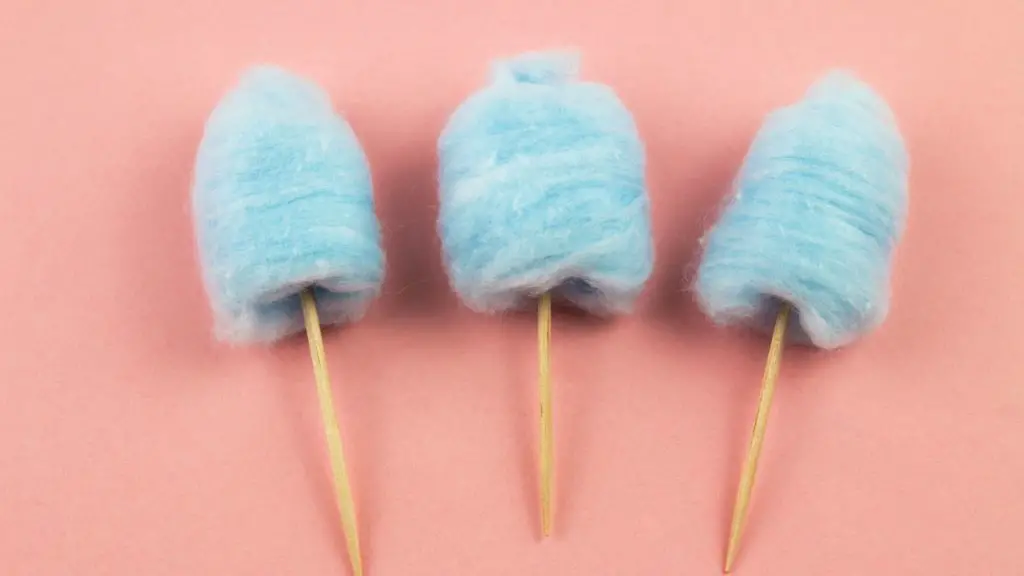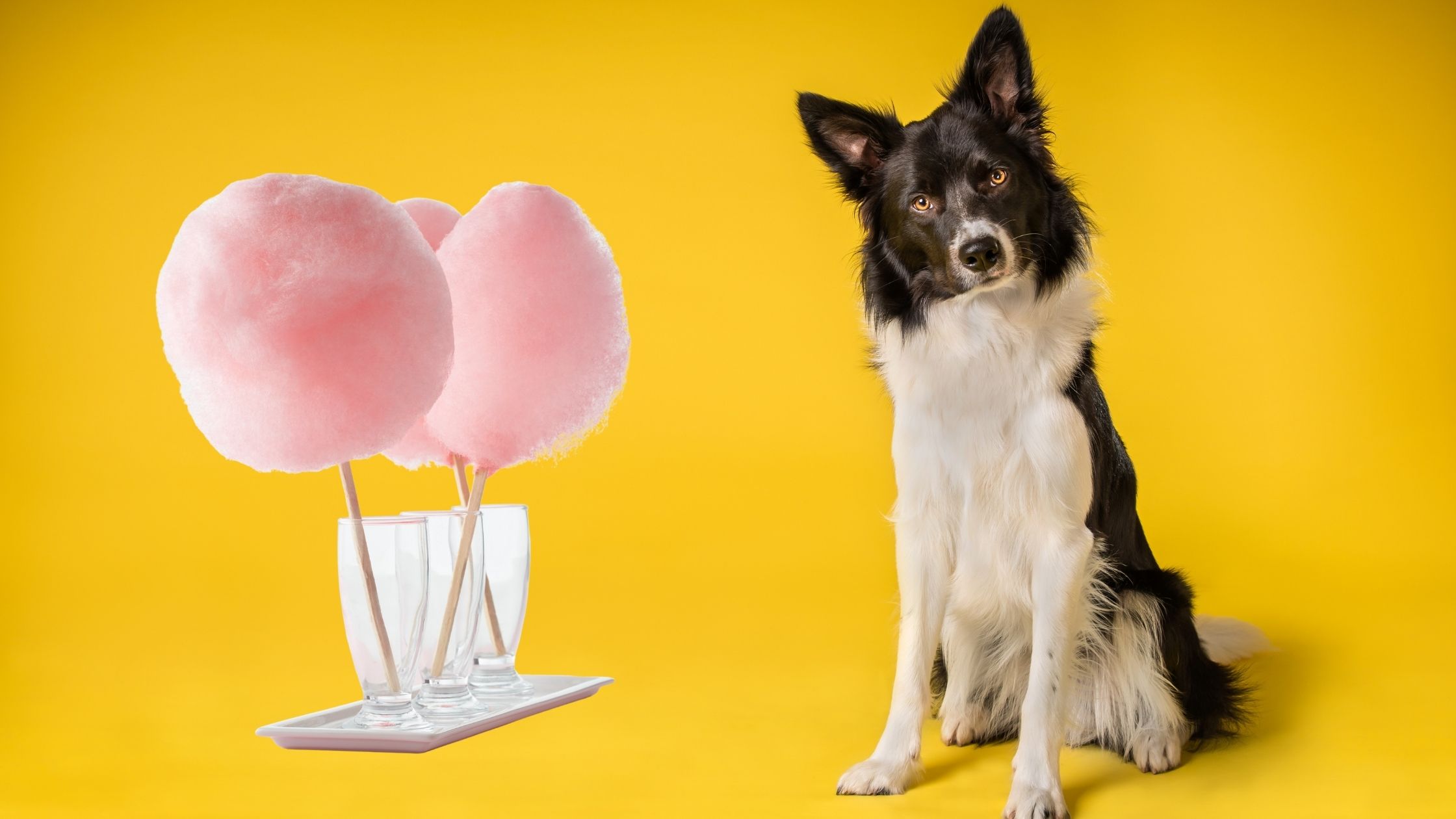Last Updated on 11/17/2021 by Veronica Jones
Regardless of how much your dog begs and pleads, there are some things that you should never give to them. You should also ensure that any potentially poisonous foods aren’t left out where your dog could access them.
Your dog may be happy to see candy, especially when they see you enjoying it. But should they be allowed to have their way? You want to make your dog happy after all, right? Not always. It should be emphasized that not everything good for humans is also good for dogs.
So, can dogs eat cotton candy? Are there any dangers? Let’s find out…
Can Dogs Eat Cotton Candy?

The answer is a resounding No! This stance is based on various factors, the most important of which is that cotton candy will almost always contain artificial sweeteners. These sweeteners may harm a dog’s teeth and stomach.

How Much Cotton Candy Can Dogs Eat?
Cotton candy, which is essentially sugar and food coloring, should not be eaten by dogs at all. Dogs who consume too much cotton candy are prone to stomach troubles and other digestive issues. Sugar content is not handled as well by dogs as it is by humans.
The use of xylitol, an artificial sweetener used in most, if not all, cotton candy recipes, is an even bigger issue. Xylitol is well known to be very harmful to dogs. Even small levels can cause seizures and hypoglycemia.
A small taste of the cotton candy might be fine (though we would still not recommend it). Still, anything more may necessitate a trip to the emergency veterinarian.
Is Cotton Candy Bad for Dogs?
Yes, cotton candy is harmful to dogs. Candy and ice cream may be fine for humans like you and me, but based on what we’ve learned so far, they aren’t good for dogs. While sugar is an important element of everyone’s diet, the type of sugar found in sweets can do more harm than good. Excessive sugar can very quickly cause a blood sugar imbalance, so any sugary treats are to be avoided. Xylitol, which is present in the average cotton candy, is also highly toxic to our canine friends and can be bad for your dog’s health even in small portions.

It’s worth noting that dogs do require sugar. Carbohydrates are also required for their survival. However, because candy has no added value, we do not need to offer it to them. Excessive consumption of these foods might cause inflammation in the body. Here are some of the consequences of your dog eating cotton candy:
- Upset stomach
It’s not easy to clean up vomit and diarrhea. You don’t want to be in a scenario where you have to constantly clean up after your dog. As a result, if you want to avoid this, make sure you don’t give children sugary foods like cotton candy.
The simple scientific answer is that dogs, like people, require a specific quantity of bacteria to efficiently digest the food they eat, thus the requirement for balance. When they ingest sugar in excess of what they are used to, their bodies are forced to strive to keep up, resulting in an upset.
- Can become toxic
Cotton candy often has two ingredients: xylitol and chocolate, neither of which I recommend for your dog.
Humans may be able to absorb theobromine readily, but dogs aren’t that fortunate. Heart stimulants, diuretics, muscle relaxants, and heart stimulants are among medical uses for theobromine. Vomiting, beating heart, thirst, restlessness, and a few other symptoms may occur due to your dog’s inability to digest them.
- Can damage their teeth
Like in humans, this shouldn’t be too difficult to explain and comprehend. Too much sugar is never good for every teeth. It’s a basic fact! The bacteria in your dog’s mouth use it to make acid, which is the chemistry behind it. These acids cause a loss of minerals in your dog’s outer layer, resulting in tooth problems.
It is nearly impossible to resist sweets. Sugar is present in almost everything your dog consumes; at best, we can reduce their carbohydrate intake while brushing their teeth. You should also make sure check your dog’s teeth regularly and take action if needed.
- Too much sugar can make your dog obese.
Dogs, too, may grow overweight. Yes, you read that correctly. If you feed sugar to your dog regularly, they will gain weight, putting a strain on their joints. Joint difficulties, tiredness, heart illness, and difficulty breathing are all common side effects.
Even if your dog may avoid the aforementioned illnesses, its quality of life will almost certainly be compromised. Overweight dogs have resulted in several life-threatening illnesses, including respiratory and cardiac problems, arthritis, and diabetes.
- Metabolism problems
When sugar levels rise, insulin levels also rise, which is required to use and store sugar. Insulin has several effects on your hormonal system, which can lead to changes in your dog’s fat storage, energy levels, immune system, and muscular tone. As a result of these changes, dogs become less active, weaker, and fatter, making them more susceptible to hormone-related diseases.

What Should I Do If My Dog Eats Cotton Candy?
If you feed your dog cotton candy by mistake, or if they manage to get some on their own, you should try to determine quickly how much they have eaten. If they have only eaten a very small amount, they will probably be fine (though it may still be worth them getting checked by a vet). However, if you are unsure about how much they have eaten, or if you know they’ve eaten more, you should take them to a vet to get checked out.
Can Cotton Candy Kill a Dog?
Technically, it could. However, the dog would need to consume a large amount of cotton candy. In most cases, a dog will be fine. However, this is on the basis that they get help from a veterinarian soon after consuming the cotton candy.

Can Dogs Eat Cotton Candy Grapes?
No. Very simply, these are grapes that have been bred to taste like cotton candy. However, just as dogs should not eat cotton candy, they should also not eat grapes. They are also toxic for dogs, so should be avoided.
In conclusion, all types of cotton candy should be kept away from dogs. Keep your dogs healthy at all times by keeping them away from sugary foods and taking them to the vet on a regular basis.

